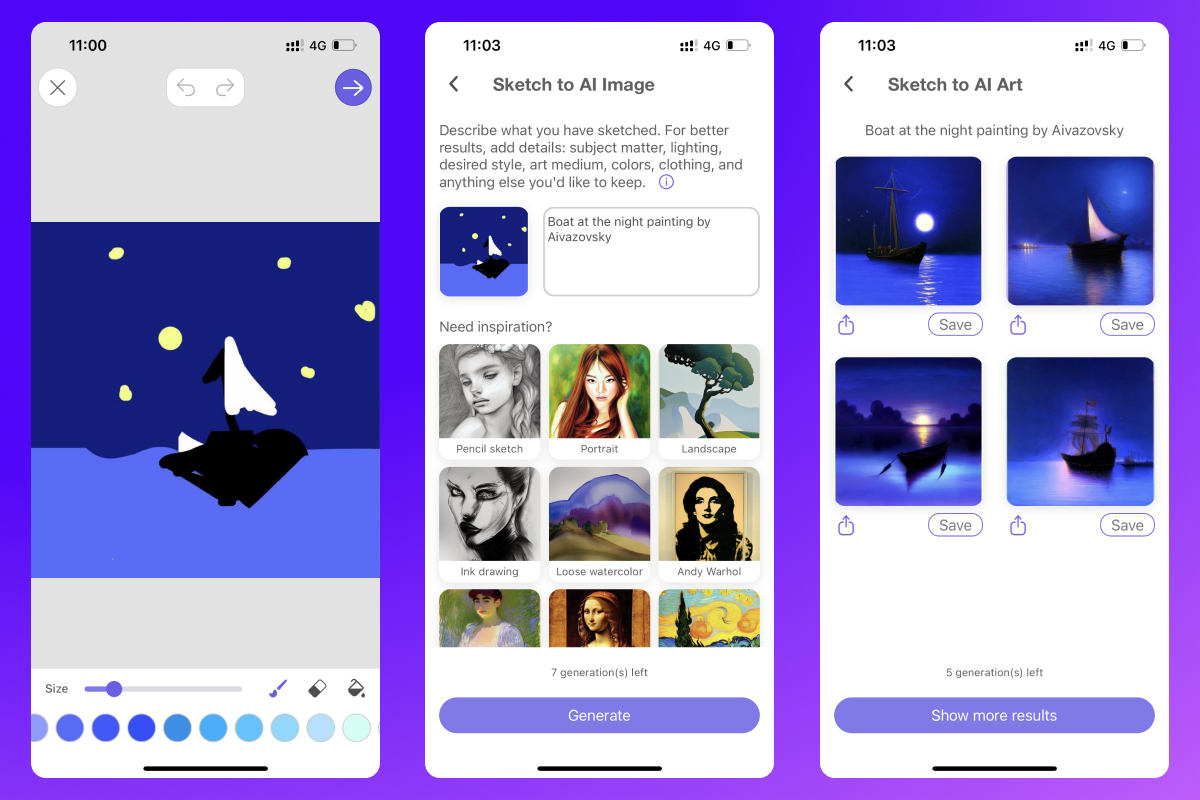Using the generative AI wave, Picsart, the developer behind numerous photograph and video enhancing apps for the online and cellular units, is introducing a brand new iOS app that transforms images and drawings into digital artwork. Referred to as SketchAI, the app lets customers sketch an image or add an present picture and apply completely different creative types to it.
SketchAI is straightforward sufficient to make use of. It options a number of pre-selected types that may be utilized to creations, together with ink drawing, pencil sketch, and the artist-inspired “Da Vinci” and “Van Gogh.” Along with sketching or importing a photograph, customers can add a immediate describing a picture (e.g., “Boat at night time portray by Aivazovsky”) to boost the generated outcomes.
SketchAI gives 5 free creations. Unlocking limitless generations requires a subscription starting from $5.99 per week to $17.99 per thirty days or $69.99 per 12 months.
“We’re planning lots in the best way of constructing the person expertise, processing and picture high quality higher, and including extra prompts and creative types,” Picsart VP of product Lusine Harutyunyan advised in an e-mail interview. “We’re additionally occupied with including options for the person to boost and play with their outcomes, as Picsart is thought for its highly effective and enjoyable enhancing instruments. Together with constructing on our essential platform, we’re excited to supply extra distinctive entry factors for inventive applied sciences like this.”
SketchAI joins Picsart’s roster of generative AI instruments, together with AI Avatar, which makes customized AI-generated profile pics from selfies, and arrives as art-generating AI apps appeal to controversy each from customers and the creative group. Lensa’s lately launched, viral avatar creator got here underneath scrutiny for its biases toward the sexualized depiction of women. In the meantime, on the artwork portal ArtStation, which earlier this 12 months started permitting AI artwork for the primary time, members broadly protested by inserting “No AI Artwork” photographs of their portfolios — asserting that AI-generated artwork threatened the creative integrity of the platform.
Picture Credit: Picsart
Harutyunyan didn’t deny that generative AI techniques have their points, even admitting that the system driving SketchAI — an open supply mannequin known as Stable Diffusion — may reproduce biases within the paintings it creates. However she argued that SketchAI and generative AI as an entire will evolve and enhance over time as extra individuals use the tech and extra fashions change into obtainable.
“These are very early days for generative AI as an entire and this know-how will proceed to evolve rapidly and we are going to proceed to stick to business requirements and finest practices because it does. Our objective is to empower creators and we help artists in every single place,” Harutyunyan mentioned.
Secure Diffusion, which is educated on photographs from across the net, together with from artwork communities, has unfold like wildfire in latest months. Lensa and DeviantArt use it to generate photographs, as does sport developer Latitude and numerous others. Many of the use instances are innocent sufficient. However some teams have wielded Secure Diffusion to create objectionable content like depictions of violence and pornographic, nonconsensual movie star deepfakes.
Stability AI was even the topic of a latest essential letter from U.S. Home Consultant Anna G. Eshoo (D-CA) to the Nationwide Safety Advisor (NSA) and the Workplace of Science and Expertise Coverage, by which she urged the NSA and OSTP to deal with the discharge of “unsafe AI fashions” that “don’t reasonable content material made on their platforms.”
Harutyunyan says that Picsart fine-tuned and optimized Secure Diffusion for “high quality, authentic picture power” in SketchAI and put filters in place to forestall some “unsafe” artwork from being generated. Picsart hasn’t, nevertheless, established a means for artists who don’t want SketchAI customers to create artwork of their distinctive types to “choose out.” In latest months, artists like Hollie Mengert and Greg Rutkowski — whose names have change into among the mostly used prompts in Secure Diffusion–powered apps — have decried what they see as poor AI imitations which are nonetheless tied to their work.
Picture Credit: Picsart
Stability AI, the startup largely funding the event of Secure Diffusion, lately bowed to stress, signaling that it will permit artists to choose out of the info set used to coach the next-generation Secure Diffusion mannequin. Harutyunyan says that Picsart will contemplate adopting the mannequin for SketchAI as soon as it’s launched.
“The baseline mannequin we’re utilizing is educated on information, not particular materials and never reproducing a particular artist’s work,” Harutyunyan mentioned.
A phrase of warning to those that’d share their SketchAI creations publicly, although: Picsart says that it could possibly’t assure customers will have the ability to declare copyright over them. That’s as a result of the copyright standing of AI-generated paintings is considerably in flux at present. The U.S. Patent and Trademark Workplace (USPTO) lately moved to revoke copyright safety for an AI-generated comedian, saying that copyrightable works require human authorship. And a class action lawsuit working its means by the U.S. court docket system alleges that generative AI violates mental property legal guidelines by regurgitating parts of the copyrighted information used to develop it.
The copyright challenge has spooked platforms like Kickstarter and Getty Photos, each of which in latest months have banned — both partially or totally — AI-generated artwork and instruments to create it out of worry of the authorized ramifications.
“As between Picsart and the person, the person owns the rights within the content material,” Harutyunyan mentioned. “Nonetheless, customers ought to concentrate on the inherent limitations that come together with generative AI.”
Source link
